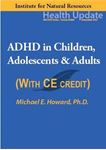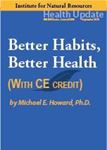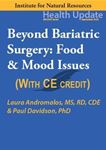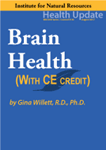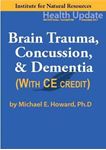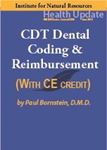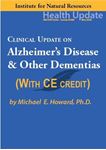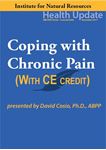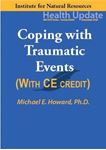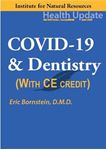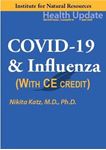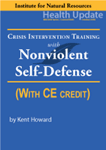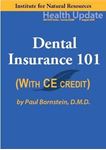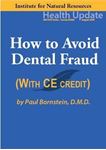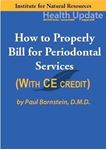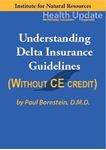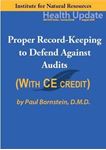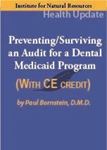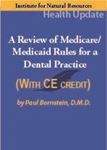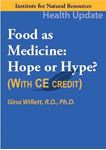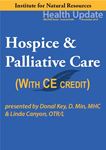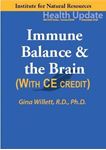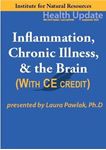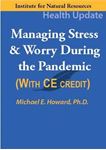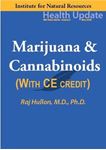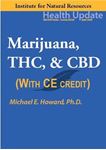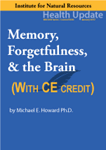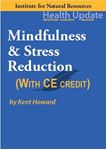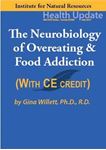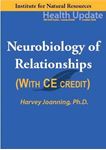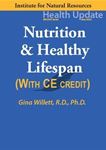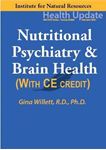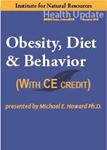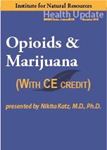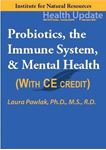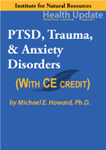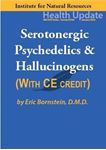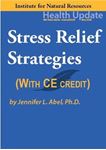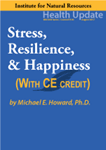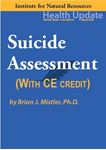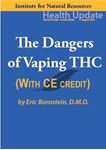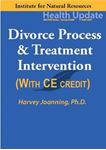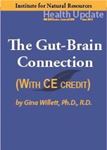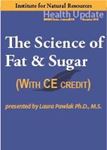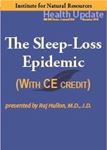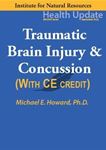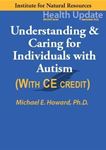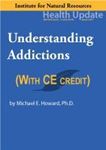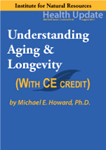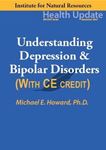You have no items in your shopping cart.
Streaming Video w/CE Credit
ADHD in Children, Adolescents, & Adults - Streaming Video - 6 Hours (w/Home-study exam)
Describes the effects of ADHD on attention, emotional control, impulse control, and executive functions. Describes the clinical presentations of ADHD and current diagnostic criteria. Discusses the genetic, developmental, neurologic and environmental causes of ADHD. Describes the development, symptoms, and impact of ADHD as they relate to children, adolescents, and adults. identify effective ADHD treatments focused on behavior management, diet, exercise, and sleep. Discusses the stimulant and non-stimulant medications for ADHD and their effectiveness. Discusses how the recent empirical research in this course can be translated to clinical practices to improve patient care and outcome. Describes, for this course, the implications for dentistry, mental health, pharmacy, nursing, occupational, physical therapy and other healthcare professions.
$83.00
Better Habits, Better Health - Streaming Video - 6 hours (w/Home-study exam)
Describes how personality types, core beliefs, and behavioral habits affect chronic illness. Discusses the most common chronic illnesses and the key factors in prevention and management. Explains how stress, anxiety, and depression influence chronic illnesses. Describes practical behavioral habits for coping with disabling chronic conditions like pain, cancer, arthritis, and other diseases. Lists ways to help patients develop healthier habits in terms of nutrition, activity, preventive medical and dental care, and emotional well-being. Describes how the information in this course can be utilized to improve patient care and patient outcomes. Describes, for this course, the implications for dentistry, mental health, and other health professions.
$83.00
Beyond Bariatric Surgery - Streaming Video - 6 Hours (w/Home-study exam)
Describes the physiological and anatomical changes associated with bariatric surgery, endoscopic bariatric therapies, and fat-reducing procedures. Identifies the components of nutritional and psychological preoperative assessments for patients undergoing bariatric surgery. Describes pre-operative and post-operative nutrition guidelines for bariatric surgery patients.
4) identify mental, physical, and emotional challenges faced by pre-operative and post-operative bariatric surgery patients. Assesses and manage nutrition complications including constipation, diarrhea, dumping syndrome, reactive hypoglycemia, gout, and kidney stones in post-operative bariatric surgery patients. Applies strategies for running effective support groups for pre-operative and post-operative bariatric surgery patients. Identifies appropriate treatments for managing post-operative weight regain. Describes how the information in this course can be utilized to improve patient care and patient outcomes.
$83.00
Brain Health - Streaming Video - 6 hours (w/Home-study exam)
The course “Brain Health: Mood, Metabolism and Cognition” provides an overview of key factors that can improve mental health, as well as to ensure cognitive health. This course includes a discussion of: (1) the importance of stress management, (2) physical activity, (3) weight management, (4) early diagnosis and proper management of diabetes and pre-diabetes, (5) key dietary factors to “defend the castle”, including the concept of “nutritional psychiatry”, (6) ways to improve gut health so as to improve brain health, (7) proper sleep hygiene, (8) the importance of oral health, and, finally, (9) how to incorporate some of the characteristics of our ancestors’ lifestyle (i.e., address our modern “Paleo-Deficit disorder).
Health professionals who complete this course will gain a much fuller understanding of the factors that impact brain health, as well as a range of techniques to help themselves, and their patients/clients, improve/preserve cognitive function and ensure positive emotional and mental health.
$83.00
Brain Trauma, Concussion, & Dementia - 6 Hours - Streaming Video (w/Home-study exam)
Describes the brain structures and functions that are most vulnerable to trauma. Outlines the major steps in assessing patients with brain trauma and predicting disability. Discusses key clinical features of concussions, penetrating head injuries, and blast injuries. Describes the relationship between brain trauma and dementing illness such as Alzheimer’s and chronic traumatic encephalopathy. Outlines the rehabilitation strategies most likely to improve outcomes in patients with brain trauma. Discusses the practical steps to prevent brain trauma from motor vehicle accidents, falls, and sports. Describes how the information in this course can be utilized to improve patient care and patient outcomes. Describes for this course, the implications for nursing, dentistry, mental health, and other health professions.
$83.00
CDT Dental Coding & Reimbursement - Streaming Video - 6 Hours (w/Home-study Exam)
Discusses strategies to protect your practice from litigation and malpractice. Determines the best practices in documentation. Evaluates the new CDT codes to prevent billing fraud and to maximize profit. Identifies what you need to be aware of to maximize billing. Examines the intricacies of the dental insurance world. Discusses how your office is being watched and how to avoid billing fraud.
$199.00
Clinical Update on Alzheimer's Disease & Other Dementias - Streaming Video - 6 Hours (w/Home-study exam)
Describes the differences between normal and abnormal brain aging. Lists measures to preserve brain function and reduce the risk for cognitive decline. Defines dementia and describe common dementia syndromes. Describes the major characteristics of and treatments for Alzheimer’s disease. Lists medications and common clinical conditions that can cause dementia-like symptoms. Describes how the information in this course can be utilized to improve patient care and patient outcomes. Describes for this course, the implications for nursing, dentistry, mental health, and other health care professions.
$83.00
Coping with Chronic Pain - Streaming Video - 6 Hours (w/home-study credit)
Explains the current state of pain management in the United States. Describes the multidisciplinary approach to pain management. Reviews the 23 different pain management modalities currently available. Describes steps to create a comprehensive pain management plan. Lists the five key coping skills for helping chronic pain patients. Discusses treatment options for chronic dental and facial pain. Describes how the information in this course can be utilized to improve patient care and patient outcomes. Describes the implications for dentistry, mental health, and other health professions.
$83.00
Coping with Traumatic Events - Streaming Video - 6 Hours (w/Home-study exam)
Identifies the major causes and pathways of the stress response. Describes how worry, traumatic events, threats, and crises can cause anxiety and trauma-related disorders. Lists the characteristics of acute stress disorder and the principles of crisis intervention. Identifies the symptoms, subtypes, and treatments of PTSD (post-traumatic stress disorder). Discusses effective stress management strategies including resilience building, mindfulness, relaxation, cognitive behavioral therapy, and medications. Lists the methods of managing compassion fatigue in caregivers and health care professionals. Describes how the information in this course can be utilized to improve patient care outcomes across disciplines. Describes, for this course, the implications for nursing, dentistry, mental health, and other health professionals and improve patient treatment co-morbidity outcomes for occupational and physical therapy.
$83.00
COVID-19 & Dentistry - 2020 - Streaming Video 3.5 Hours (w/Home-study exam)
Defines and explain dental aerosols.Outlines the pathogens that live in dental aerosols and explain how far they travel and survive. Describes the COVID-19 Virus, and how it infects human cells. Outlines the different co-morbidities that make acquiring COVID-19 more probable and dangerous.
Explains what options are available for a “transmission-based precaution” program in the dental office. Explains the concepts of a “respiratory protection program” and an “airborne infection isolation” room in a dental office. Lists and defines the different technologies that can be utilized in a dental environment to achieve “transmission-based precaution” solutions in a dental office. Summarizes essential lifestyle changes dentists and staff can make to improve their immune system in a post-COVID-19 environment.
$69.00
COVID-19 & Influenza - Streaming Video - 4 Hours (w/home-study exam)
Identifies key aspects of the transmission, diagnosis, treatment, containment, and prevention of coronaviruses. Describes the patterns of illness and treatment guidelines for 2020 seasonal influenza A & B. Outlines the principles of prevention, choices of personal protective equipment and hygiene measures necessary to control the current epidemic. Lists strategies to recognize and protect the most vulnerable, high-risk patients from coronaviruses and influenza. Describes, for this course, the implications for nursing, dentistry, mental health, and other health professionals, and improve patient treatment co-morbidity outcomes for occupational and physical therapy.
$69.00
Crisis Intervention Training with Nonviolent Self-Defense - Streaming Video - 2 Hours (w/Home-study exam)
In this DVD presentation, Master Instructor Kent Howard will guide the viewer through basic methods of self-protection, retreat, and escape. He will demonstrate skills to deal with seizures and strikes. Finally, he will describe how to engage, control, and restrain an angry or aggressive client. This course will satisfy 2 contact hours in Category 5 for patient safety for pharmacist and pharmacy technician credits.
After completing this course, participants will be able to 1) describe strategies for self-protection, retreat, and escape, 2) demonstrate core skills for defense against seizures and strikes, 3) describe how to engage and gain control over a client who is acting out; and 4) explain the role of self-defense and humane care in crisis intervention.
After completing this course, participants will be able to 1) describe strategies for self-protection, retreat, and escape, 2) demonstrate core skills for defense against seizures and strikes, 3) describe how to engage and gain control over a client who is acting out; and 4) explain the role of self-defense and humane care in crisis intervention.
$49.00
Dental Series 2022: #1 Dental Insurance 101 - Streaming Video - 2 Hours (w/Home-study Exam)
This is recording Part 1 of 7 from a dental insurance series of live webinars by the renowned expert, Dr. Paul Bornstein, D.M.D, on the topics of fraud, dental coding, record-keeping, and insurance reimbursement. It is critical to the health and safety of your dental office/business to understand these topics.
$59.00
Dental Series 2022: #2 How to Avoid Dental Fraud - Streaming Video - 2 Hours (w/Home-study Exam)
This is recording Part 2 of 7 from a dental insurance series of live webinars by the renowned expert, Dr. Paul Bornstein, D.M.D, on the topics of fraud, dental coding, record-keeping, and insurance reimbursement. It is critical to the health and safety of your dental office/business to understand these topics.
$59.00
Dental Series 2022: #3 How to Properly Bill for Periodontal Services - Streaming Video - 2 Hours (w/Home-study Exam)
This is recording Part 3 of 7 from a dental insurance series of live webinars by the renowned expert, Dr. Paul Bornstein, D.M.D, on the topics of fraud, dental coding, record-keeping, and insurance reimbursement. It is critical to the health and safety of your dental office/business to understand these topics.
$59.00
Dental Series 2022: #4 Understanding Delta Insurance Guidelines - Streaming Video (w/home-study) - 2 hours
This is recording Part 4 of 7 from a dental insurance series of live webinars by the renowned expert, Dr. Paul Bornstein, D.M.D, on the topics of fraud, dental coding, record-keeping, and insurance reimbursement. It is critical to the health and safety of your dental office/business to understand these topics.
$59.00
Dental Series 2022: #5 Proper Record-Keeping to Defend Against Audits - Streaming Video - 2 Hours (w/Home-study Exam)
This is recording Part 5 of 7 from a dental insurance series of live webinars by the renowned expert, Dr. Paul Bornstein, D.M.D, on the topics of fraud, dental coding, record-keeping, and insurance reimbursement. It is critical to the health and safety of your dental office/business to understand these topics.
$59.00
Dental Series 2022: #6 Preventing/Surviving an Audit for a Dental Medicaid Program - Streaming Video - 2 Hours (w/Home-study Exam)
This is recording Part 6 of 7 from a dental insurance series of live webinars by the renowned expert, Dr. Paul Bornstein, D.M.D, on the topics of fraud, dental coding, record-keeping, and insurance reimbursement. It is critical to the health and safety of your dental office/business to understand these topics.
$59.00
Dental Series 2022: #7 Review of Medicare/Medicaid Rules for a Dental Practice - Streaming Video - 2 Hours (w/Home-study Exam)
This is recording Part 7 of 7 from a dental insurance series of live webinars by the renowned expert, Dr. Paul Bornstein, D.M.D, on the topics of fraud, dental coding, record-keeping, and insurance reimbursement. It is critical to the health and safety of your dental office/business to understand these topics.
$59.00
Food as Medicine - Streaming Video - 4 Hours (w/Home-study Exam)
Identifies food constituents (macro and micro-nutrients, phytonutrients) that can help prevent or treat disease. Describes how modern processed foods can adversely impact health. Outlines the major benefits of healthy eating related to immune function, aging, gastrointestinal (GI) functions, and cognition. Explains the role of nutrigenomics and personalized nutrition in optimizing gene activity or expression. Describes how nutrition myths, pseudoscience, and an obsession with “clean eating” can compromise health and lead to orthorexia. Outlines how the information in this course can be used to improve patient care outcomes. Describes, based on the information presented, the implications for dentistry, mental health, pharmacy, nursing, dentistry, occupational, and physical therapy, and other health professionals.
$69.00
Hospice & Palliative Care - streaming video - 3 Hours (w/Home-study exam)
Reviews the recent Medicare law regarding end-of-life discussions with patients and define options for patient and provider consideration. Discusses the psycho-social implications of death and dying among varied cultures and religions and how this effects healthcare delivery. Identifies the concerns most expressed by the dying. Identifies patient rights to live with dignity and as much independence as possible until the end. Cites the philosophy, history and tradition of death and dying over time and how current beliefs developed. Discusses heroic measures verses natural death and discuss caregiver support. Describes the stages of death, the timeline of what happens to the physical remains after death, and care of the body after death. Identifies necessary legal documents regarding death, disposition of the body, family and patient rights, and how these important statutes assist the poor and the marginalized.
$49.00
Immune Balance & the Brain - Streaming Video - 6 Hours (w/Home-study Exam)
Describes components of the immune system and principles of normal immune function. Reviews the clinical features of common autoimmune, allergic and inflammatory conditions. Explains potential immune factors that may contribute to depression and other psychiatric disorders. Describes the link between poor oral health and immune dysfunction. Lists the dietary, pharmacologic, and lifestyle changes that may help balance immune function. Describes how the information in this course can be utilized to improve patient care and patient outcomes. Describes, for this course, the implications for dentistry, mental health, nursing, and other healthcare professions.
$83.00
Inflammation, Chronic Illness, & the Brain - Streaming Video - 6 Hours (w/home-study credit)
Identifies clinical signs & symptoms of inflammation. Describes the connections between inflammatory processes and chronic illness. Describes the role of inflammation in specific illnesses such as heart disease, COPD, diabetes, arthritis, and dementia. Lists practical strategies to reduce levels of inflammation in clinical practice. Explains the rationale for good dental prophylaxis and skin care in patients with chronic illness. Describes how the information in this course can be utilized to improve patient care and patient outcomes. Describes, for this course, the implications for dentistry, mental health, and other health professions.
$83.00
Managing Stress & Worry During the Pandemic - Streaming Video - 6 Hours (w/Home-study)
Describes how survival behavior is produced by the brain. Identifies the characteristics of cognitive appraisals, core beliefs, emotions, and moods. Discusses the positive and negative effects and impacts of acute and chronic stress, and the major causes and pathways of the stress response. Describes the physical, mental, and emotional consequences of COVID-19 for patients, their families, and healthcare providers. Discusses methods of preventing chronic stress and anxiety during the COVID-19 pandemic by building resilience and optimism. Discusses effective stress management strategies, including mindfulness, relaxation body therapies, cognitive-behavioral therapy, medications, diet, and exercise. Describes how the information in this course can be utilized across the disciplines to improve patient care outcomes.
$83.00
Marijuana & Cannabinoids - Streaming Video (w/home-study)
Outlines and describe the difference between Marijuana, Synthetic Marijuana, Hemp and various marijuana alternatives. Identifies the difference between CBD, THC and Synthetic Cannabinoids. Reviews the current “Legal Status” of Cannabis and Synthetic Cannabinoids in America. Describes the troublesome new statistics concerning addiction and the increase in “Youth Vaping” of THC and CBD. Explains human Opioid Receptors, Opioid analgesia and compare this to the Human Endocannabinoid system. Reviews the real evidence (or lack thereof) for pain control and analgesia with THC, CBD, and marijuana alternatives. Lists the difference between THC Oil, Marijuana Oil, Cannabis Oil, Hash Oil, CBD Oil, and Hemp Oil. Reviews the critical Adverse Drug Reactions that occur with THC and CBD. Describes how the information in this course can be utilized to improve patient care and patient outcomes. Describes, for this course, the implications for dentistry, mental health, nursing, and other healthcare professions.
$83.00
Marijuana, THC, & CBD - Streaming Video (w/home-study)
Describes the pharmacologic differences among cannabis (marijuana), THC and cannabinoids. Discusses the major legal issues surrounding THC at the Federal and State levels. Lists the physiologic and pathologic effects of marijuana (THC) including effects of long term use and potential harm to the adolescent brain. Describes FDA-approved uses for medical marijuana and possible clinical uses for cannabis in chronic pain patients. Explains the known dangers of vaping marijuana and development of EVALI (Lung Injury Due to E-Cigarettes and Vaping). Recognizes the signs and symptoms of acute marijuana intoxication. Discusses the myths and realities surrounding the explosion of CBD products across the country. Describes how the information in this course can be utilized to improve patient care and patient outcomes. Describes, for this course, the implications for dentistry, mental health, nursing, and other healthcare professions.
$83.00
Memory, Forgetfulness, & the Brain - Streaming Video - 6 Hours (w/Home-study exam)
Describes the essential components of forming, storing, and retrieving memories. Lists practical ways that perception, time, emotions, stress, and sleep affect memory. Discusses the differences between normal forgetting, age-related memory decline & amnesia syndromes. Lists the common lifestyle factors, medical conditions and medications that can compromise memory. Describes useful strategies to preserve memory & help patients and caregivers cope. Describes how information in this course can be utilized to improve patient care and patient outcomes. Describes, for this course, the implications for dentistry, mental health, and other health professions.
$83.00
Mindfulness & Stress Reduction - Streaming Video - 6 Hours (w/Home-study)
Cites various effects of stress on the nervous system, including sympathetic arousal and the adrenal response. Describes the role of chronic stress in physical and psychological illnesses. Outlines mind-body therapies suitable for integrative health practices. Demonstrates the practical techniques related to mindful relaxation. Discusses the role of meditation and breathing techniques in stress reduction programs. Demonstrates simple exercises for use in alleviating stress symptoms. Describes how the Relaxation Response engages the parasympathetic nervous system. Describes strategies for integrating mindful stress-reduction methods into nursing, mental health, dentistry and other clinical practices.
$83.00
Neurobiology of Overeating & Food Addiction - Streaming Video - 6 Hours (w/Home-study Exam)
Outlines the homeostatic and hedonic pathways that interact to regulate food consumption. Describes the neurobiology of overeating, altered brain structures and changes in chemical signaling that contribute to impaired food regulation. Outlines the evidence that supports the concept of food addiction, as well as the opposing view. Lists factors that contribute to overeating: genetics, epigenetics, hyperpalatable foods, gut dysbiosis, stress, maternal and early life factors, circadian disruptions, etc. Outlines potential approaches to control overeating: abstinence models, dietary modifications, cognitive therapies, neuromodulation, microbial manipulation and bariatric surgery. Describes how the information in this course can be utilized across the disciplines to improve patient care and outcomes. Describes, for this course, the implications for dentistry, mental health, nursing, pharmacy, occupational and physical therapy treatment goals, and other healthcare professions.
$83.00
Neurobiology of Relationships - Streaming Video - 6 Hours (w/home-study)
Over the last 20 years, advances in neuroimaging have allowed scientists to directly observe brain functions while humans are engaging in behavior. This research has led to an improved understanding of how our brain functions when we are interacting with our mates and children. This workshop focuses on how to use this emerging knowledge of brain function to improve how we conduct therapy with individuals in intimate relationships.
$83.00
Nutrition & Healthy Lifespan - Streaming Video - 4 Hours (w/Home-study Exam)
Describes the role of genetics vs. lifestyle in the aging process. Explains how key hallmarks of aging can be influenced by eating healthy foods in a healthy manner. Outlines the research supporting the benefits of caloric restriction, intermittent fasting, and time-restricted eating. Describes the optimal amounts, types, and distribution of protein intake to maintain muscle health and functional independence. Outlines the most common nutritional deficiencies in older patients and the role of obesity in accelerating the aging process. Discusses the role of prebiotics, probiotics, and gastro-intestinal health in older patients. Describes how this course would help professionals in dietetic, nursing, mental health, pharmacy, dentistry, occupational therapy, and physical therapy to improve patient care outcomes.
$69.00
Nutritional Psychiatry & Brain Health - Streaming Video - 4 Hours (w/Home-study Exam)
Lists key nutritional factors that are essential for a healthy brain throughout the lifespan. Explains how inflammation can contribute to depression and other psychiatric disorders. Describes how poor gut health and an altered gut microbiota could lead to neuropsychiatric and neurodegenerative consequences. Outlines the components of an anti-inflammatory diet to improve mental and cognitive health, as well as the strength of evidence to support the use of dietary supplements. Explains the link between stress and anxiety and food intake. Describes how the information in this course can be utilized to improve patient care and patient outcomes.
$69.00
Obesity, Diet, & Behavior - Streaming Video - 6 Hours (w/Home-study exam)
Explains the complex nature of body fat and why both too much and too little are deleterious to health. Describes how genes, eating behavior, macronutrients, physiology, microorganisms, and the environment interact to produce obesity. Outlines how the food industry’s production of hyperpalatable foods fuels sweet, fat, and salt addiction and the obesity epidemic. Identifies the most effective diets that could produce long-lasting results in weight loss. Explains strategies for maintaining successful weight loss, managing food cravings, and treating emotional overeating. Identifies the relative effectiveness of diet, exercise, medications, and surgery in maintaining weight loss. Describes how the information in this course can be utilized to improve patient care and patient outcomes. Describes, for this course, the implications for dentistry, mental health, nursing, and other healthcare professions.
$83.00
Opioids & Marijuana - Streaming Video - 6 Hours (w/Home-study exam)
Outlines the neurologic, genetic, and social mechanisms of opioid abuse, especially in relation to the nationwide, opioid health emergency. Lists diagnostic signs and psychological “red flags” common in opioid abuse and opioid overdose. Reviews the current guidelines for the use of opioids in patients with acute and chronic pain. Lists the parameters of opioid use and abuse to be documented in all clinical, dental, and health care settings. Explains opioid replacement therapy (e.g., methadone, buprenorphine) and the use of opioid antagonists in acute overdose. Describes the risks and toxicities (inclusive of accidental overdose in first responders and healthcare professionals) of fentanyl and derivatives, as well as over-the-counter abusable drugs. Describes the short-term and long-term neurologic, psychosocial, and metabolic effects of cannabis (marijuana) use and outline these effects in relation to opioid abuse, pain inhibition, and the modulation of neurotransmitters. Lists the subterfuges aimed to prevent the CDC (Center for Disease Control and Prevention)-mandated detection of drugs of abuse and the methods for reduction of false positives and false negatives. Describes how the information in this course can be utilized to improve patient care and patient outcomes. Describes, for this course, the implications for dentistry, mental health, nursing, and other healthcare professions.
$83.00
Probiotics, the Immune System, & Mental Health - Streaming Video - 6 Hours (w/Home-study exam)
Identifies the human microbiota, including beneficial bacteria (probiotics) and beneficial fiber (prebiotics).
Describes the effects of human microbiota with regard to the digestive, immune and mental health conditions. Lists the pro- and anti-inflammatory influences, including those of essential lipids and amino acids. Identifies interventions to address chronic inflammation, pathological appetite, and mental health manifestations of microbiome imbalance. Identifies mental health consequences of gastrointestinal pathobionts as related to various mental disorders. Discusses the role of the immune system with regard to cariogenic bacteria and regeneration of dentin. Describes how the information in this course can be utilized to improve patient care and patient outcomes. Describe, for this course, the implications for dentistry, mental health, nursing, and other healthcare professions.
$83.00
PTSD, Trauma, & Anxiety Disorders - Streaming Video - 6 Hours (w/Home-study exam)
Describes the structure and function of neurons, glia, neurotransmitters, and brain regions. Explains how the brain produces and is a ected by anxiety, trauma disorders, and depression. Describes how stress is the foundation for anxiety, PTSD (post-traumatic stress disorder), trauma, and many depressions. Describes the new criteria for the diagnosis of PTSD, trauma disorders, and anxiety disorders. Outlines the symptoms and treatment of the major anxiety disorders, including dental anxiety. Lists the difference in symptoms and treatment of trauma disorders, including PTSD. Explains the nature and course of depression as a co-factor in PTSD, trauma, and anxiety disorders. Describes, for this course, the implications for dentistry, mental health, nursing, and other healthcare professions.
$83.00
Serotonergic Psychedelics & Hallucinogens - Streaming Video (w/Home-study exam)- 4 hours
Lists the psychedelic and hallucinogenic drugs commonly encountered in current clinical settings. Discusses the effects of psychedelic drugs and hallucinogens on perception and judgment. Describes the clinical hallmarks of hallucinogen use such as pupillary changes, sweating, palpitations, and ataxia. Lists the short and long term effects of hallucinogenic drugs, including flashbacks and persisting perception disorder. Describes the major clinical findings in patients using Psilocybin, Mescaline, and DMT. Discusses the clinical importance of recognizing psychedelic drug use in patients seen by professionals in mental health, pharmacy, nursing, dentistry, occupational, and physical therapy.
$69.00
Stress Relief Strategies Healthcare Providers on the Frontlines of COVID-19 - Streaming Video - 2 Hours (w/home-study)
Healthcare professionals on the COVID-19 frontlines are overwhelmed, traumatized, and exhausted. You’re putting your lives on the line, many of you are quarantined from your family, some have insufficient PPE, and insufficient resources for patients such that you are faced with lose-lose decisions. Many of you are having to see an unprecedented number of people suffer and die; sometimes even colleagues, friends and relatives.
Time is short, so this brief webinar is jam packed with strategies to manage your anxiety, fatigue, and grief through the COVID-19 crisis. Dr. Jennifer L. Abel, anxiety and worry expert, will teach you at least six effective coping strategies that you can utilize without stopping your work flow. Some of these strategies will also help to conserve energy to manage fatigue.
While you are very strong, you are human. Understand the research supporting the importance of releasing your healthy emotions with advice on safely expressing it.
You are fabulous at taking care of others, but most of you aren’t nearly as good at taking care of yourself. This is the time for you to learn to ask for help and to take care of yourself both during and after your shifts. Dr. Abel will help you to get the help you desperately deserve.
$39.00
Stress, Resilience, & Happiness - Streaming Video - 6 Hours (w/Home-study exam)
Describes how perception, thinking, emotions, and memory combine to produce cognitive appraisals and behavior. Outlines the causes, components, and management of psychological stress. Defines resilience and explain the factors that compose the ability to “bounce back” from stressful events. Lists the major components of the positive-psychology approach to increasing life satisfaction. Identifies the elements of happiness and optimism and how to apply them to increase well-being. Describes how the information in this course can be utilized to improve patient care and patient outcomes. Describes, for this course, the implications for dentistry, mental health, nursing, and other healthcare professions.
$83.00
Suicide Assessment - Streaming Video - 6 Hours (w/Home-study)
Describes suicide risk assessment including how to structure an assessment interview, understand risk level, and take appropriate actions based on risk level and best practice. Identifies important elements of appropriate documentation for risk assessment. Discusses treatment and management of suicidal risk including evidence-based treatments with data from the past four years, safety planning, and continuity of care. Discusses suicide among veterans, including population-specific data, risk/protective factors, and intervention strategies. Describes importance of sensitivity to the client population we are discussing and the role of lived experience of survivors. Describes the implications of content learned in this course for nursing, dentistry, mental health, and other health care professions.
$83.00
The Dangers of Vaping THC - Streaming Video - 3 Hours (w/Home-study Exam)
Reviews the history of vaping. Outlines the difference between vaping and smoking. Describes the various vaping alternatives currently in the market such as liquid, concentrates and plant material. Outlines the difference between THC and nicotine vaping. Describes the increase in “youth vaping” of THC, CBD, and synthetic cannabinoids in America. Explains the real evidence (or lack thereof) for EVALI and vaping disease. Lists the difference between THC Oil, Marijuana Oil, Cannabis Oil, Hash Oil, CBD Oil and Hemp Oil. Reviews the critical Adverse Reactions that occur with vaping THC.
$49.00
The Gut-Brain Connection - Streaming Video - 6 Hours (w/Home-study Exam)
Explains the concept of the gut-brain axis, and its implications for health and disease. Describes how microbes and their metabolites communicate with the body and the brain. Explains how the microbiome-gut-brain axis influences the development of neurodegenerative, neuropsychiatric, and neurodevelopmental disorders. Describes how microbial metabolites regulate immune and metabolic pathways in the body, and how this may impact risk of allergies, autoimmune diseases, obesity and diabetes. Explains how the ecology of the oral microbiome impacts both gut and systemic health; discusses implications for modern-day oral healthcare. Lists potential microbial and gut health disruptors, as well as therapeutic strategies to improve gut and brain health (to become “ecosystem engineers”). Describes ways in which the highly complex gut-brain scientific research has been oversold and misinterpreted by the lay press. Identifies red flags of “pseudoscience” to become a healthy skeptic. Describes how the information in this course can be utilized to improve patient care and patient outcomes.
$83.00
The Science of Fat & Sugar - Streaming Video - 6 Hours (w/Home-study exam)
Identifies metabolism and physiology of lipids and carbohydrates in health and disease as well as in the aged individual. Lists the approaches to a patient suffering from metabolic disease from the nursing, pharmacological, psychological, and physical therapy standpoints. Compares and contrast appetite suppressants and other medications that induce weight loss. Discusses the recent discoveries in neurochemistry and neuroscience of the link between behavioral pathology and metabolic disease. Compares and contrast the healthy and the potentially dangerous weight loss strategies and long-term effects of fad diets. Describes the oral health implications of metabolic disease as well as eating disorders. Describes the empiric developments in bariatric treatments, their implications for nursing practice, and behavioral therapies. Lists sources of benecial lipids and carbohydrates and methods of improvement of palatability of the healthier foods. Identifies the role of the oral microbiome, periodontal disease, and S. mutans in appetite pathology, binge eating and obesity.
$83.00
The Sleep-Loss Epidemic - Streaming Video - 6 Hours(w/Home-study exam)
Describes the stages, cycling, and circadian rhythms of sleep. Cites evidence connecting sleep deprivation and sleep disorders to heart disease, stroke, diabetes, and dementia. Lists the major sleep medications with their uses and adverse effects. Describes the connection between dental pain and sleep disruption. Cites the diagnostic criteria, symptoms, course, and treatment for the major sleep disorders. Describes how the information in this course can be utilized to improve patient care and patient outcomes. Describes, for this course, the implications for dentistry, mental health, nursing, and other healthcare professions.
$83.00
Traumatic Brain Injury & Concussion - Streaming Video - 6 Hours (w/Home-study Exam)
Lists the brain structures that are most vulnerable to traumatic injury. Outlines the major mechanisms of action causing brain damage after TBI. Describes the major risk factors for TBI and key preventive strategies. Outlines the assessment and management strategies for athletes who sustain concussions. Lists the main etiology, symptoms, and stages of chronic traumatic encephalopathy. Discusses the common clinical problems seen in patients with TBI, form ICU care to outpatient rehabilitation. Discusses how the information from this course can be utilized by nurses, mental health professionals, dentists, pharmacists, physical therapists, occupational therapists, dietitians, and other health professionals to improve patient care outcomes.
$83.00
Understanding & Caring for Individuals with Autism - Streaming Video - 6 Hours (w/Home-study Exam)
Describes the history and development of the concept of autism as a spectrum condition. Identifies the current DSM-5 diagnostic criteria for Autism Spectrum Disorder, several co-occurring disorders, and other similar neurodevelopmental disorders like Rett Syndrome and Fragile X. Discusses the difference between considering autism to be (a) a neurodivergent development of normal brain functions and (2) a mental disorder. Describes the remarkable heterogeneity of strengths and deficits of individuals with autism spectrum disorder, including major challenges for support and treatment. Identifies patterns of structural and functional changes in the brain in individuals with autism. Discusses the variety of evidence-based behavioral and medical treatments for Autism Spectrum Disorder. Describes how the information from this course can be utilized across health care disciplines, including dentistry, mental health, pharmacy, psychology, social work, counseling, nursing, occupational therapy, physical therapy, speech-language pathology, dietetics, and other healthcare professions to improve patient care outcomes.
$83.00
Understanding Addictions - Streaming Video - 6 Hours (w/Home-study exam)
Describes the main brain functions that contribute to addictive behavior. Explains the major ways that addiction changes the brains of addicts. Describes how drugs mimic and alter neurotransmitters which provoke the psychological effects of addiction. Explains the difference between drug dependence, tolerance, and addiction. Describes the clinical consequences of addiction to food, opioids, street drugs, and alcohol. Lists and compare the major treatment options for legal and illegal drug addictions. Describes how the information in this course can be utilized to improve patient care and patient outcomes. Describes, for this course, the implications for dentistry, mental health, and other health professions.
$83.00
Understanding Aging & Longevity - Streaming Video - 6 Hours (w/Home-study exam)
Describes how the biopsychosocial model of health and how disease impacts aging, health, life span, and longevity. Explains the dfferences between normal aging and age-related disease and their effects on life span and longevity, including periodontal disease. Describes the effects of genetics, epigenetics, and the environment on aging. Describes how the body and brain age at the cellular, tissue, organ, and organ system levels. Explains the causes of recent increases in life expectancy in the world and the United States. Describes the “super-ager” centenarians who have the longest and healthiest lives among all people. Lists the ten bio-psycho-social behavioral choices that everyone can do to extend health and life spans. Describes how the information in this course can be utilized to improve patient care and patient outcomes. Describes, for this course, the implications for dentistry, mental health, nursing, and other healthcare professions.
$83.00
Understanding Depression & Bipolar Disorder - Streaming Video - 6 Hours (w/Home-study exam)
Explains how changes in brain chemistry and structure occur in depression and bipolar disorder. Determines how chronic stress becomes a pathway for the development of major depressive disorder. Describes the new DSM-V criteria for the diagnosis of major depressive disorder and bipolar disorder. Outlines suicide risk factors and suicide prevention strategies, including the risk for suicide in dentists. Lists the differences in symptoms and treatment of major depressive disorder and bipolar disorder. Explains the differences between Bipolar I Disorder, Bipolar II Disorder, cyclothymia, and related subtypes. Describes how the information in this course can be utilized to improve patient care and patient outcomes. Describes, for this course, the implications for dentistry, mental health, nursing, and other healthcare professions.
$83.00
- 1
- 2

